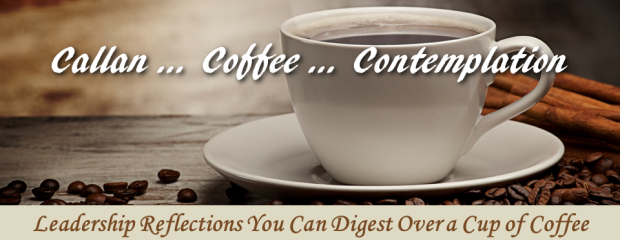Callan…Coffee…Contemplation for the Week of April 13th
Is There Time?
Is there time?
…to lead.
…to follow.
…to mentor.
…to learn.
…to celebrate.
…to mourn.
…to act.
…to dream.
Is there time?
There is.
The Role of Legend and Lore
As a Marine, much of my deep appreciation for the term “Marine” was conveyed to me via legend and lore. I like to think of legend and lore as the vitally necessary mythology of all great organizations. To fully understand the perennial knowledge, foundational ethos, and unifying symbols of our organizations, we need epic stories to move us out of our heads and into our hearts. We need legend and lore to point us to broader patterns of living to help produce coherence and meaning beyond the limiting lens of the moment. There are three essential qualities legend and lore help bring to organizations: They illustrate truth; they illuminate meaning, and they elevate ambition. Leaders everywhere should tap into the heroes of their organizations, and find every opportunity to tell, and retell, stories of legend and lore. Moreover, these stories help bind different generations through the common reference points found in these tales, a sort of rallying call toward shared intentionality.
Nix the Quick Fix
Some things in life clearly deserve quick fixes: Long lines at the DMV; a fire in a packed theater; a stuck elevator in a high rise. We are right in demanding instant gratification in these cases. How about becoming great leaders; should we expect a quick fix? I don’t think so. It’s not that we can’t contrive ways to dumb down leadership into tidy list and menus; many people do this every day in blogs. But when we make this mistake; when we demand instant gratification on things like leadership that, by their very nature defy quick fixes, we simply create illusions and false promises. More worrisome, we degrade things that are meant to be majestic and we denigrate them into mindless tactics. Leadership is a master craft, no less awesome, and, yes, no less mysterious, than great art, poetry, or music. Imagine walking up to a great artist like Rembrandt and asking him to teach you to become a master painter in “3 easy steps.” Why then do we approach leadership as if we could teach someone that way? So, let’s nix the quick fix. Is this harsh medicine? Perhaps. But it is the only path to excellence and the only way to produce masterful leaders.
Rapport
Rapport is a term we should always closely associate with great leadership, yet I find hardly a mention of it in modern leadership speech. Rapport is genuine empathy existing between people fused in common purpose and meaning. Rapport is deep emotional relating; an almost DNA-level trust shared by groups galvanized in the crucible of common sacrifice and collaborative pursuit. I find I can walk into a group of co-workers and, within minutes, discern whether rapport exists within the group. When rapport is present in a group, a kind of esprit and élan naturally exudes. The group is animated by confidence, respect, mutual affection, and resiliency. Conversely, when rapport is absent, the group exists in a wasteland environment, barren of vitality and low on optimism, and the most telling characteristics tend to be divisiveness, pettiness, and tribal allegiances. But here’s the key point for us to remember: Rapport is cultivated by intentional leaders. Rapport is not automatic; it is manufactured purposefully, act-by-act, day-by-day, year-after-year. You want to be a champion? Build and sustain rapport in your group.
Too Many Choices, Too Little Time
On a recent business trip to Asia I again saw the raw power and pervasiveness of technology in our world. From the airport, to the taxi, to the hotel and all the other virtual realities in between, we truly live on a tech-centered globe. Amazing stuff. But in spite of this I was equally struck by how harried, detached, and episodic many of us are becoming. Too many choices, too little time. And what does this observation have to do with leading? A lot. Leading requires occasional solitude, presence in the moment, awareness, and the ability to regularly reflect on broad arcs of time and broad patterns of living. The vortex of social media, if not self-controlled, can pull leaders out of awareness, ensnaring them in increasingly transitory impulses. And here’s what we know from history: Nothing great comes from a limited, harried, and episodic lens. Too many choices, coupled with too little time, produces too many burned out souls.
Check back next Monday for a round up of this week’s social media shares. Or check us out on Facebook,Twitter, Google+, or Pinterest to see our posts every day!
Tweet Share






